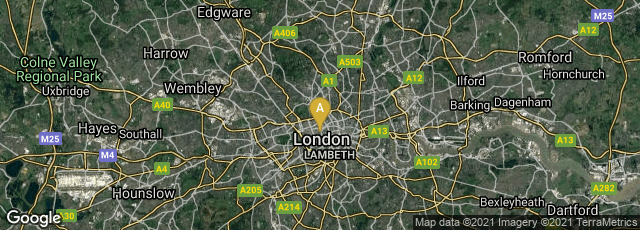

A: London, England, United Kingdom
In a remarkable autograph letter to Cornish engineer, author and politician Davies Gilbert, engineer and manufacturer Matthew Robinson Boulton, son of Matthew Boulton, and business partner of James Watt, eloquently described the importance of private enterprise in the Industrial Revolution of England. Boulton wrote the letter in the context of the Gas Light Bill in Parliament authorizing the formation of a monopolistic Gas Light and Coke Company to provide gas lighting throughout England. Gas light technology had been pioneered by William Murdoch (sometimes spelled "Murdock"), an employee of Boulton and Watt at their Soho Foundry works in Birmingham. In the early 1790s, while overseeing the use of his company's steam engines in tin mining in Cornwall, Murdoch began experimenting with various types of gas, finally settling on coal-gas as the most effective. He first lit his own house in Redruth, Cornwall in 1792. In 1798, Murdock used gas to light the main building of the Soho Foundry and in 1802 lit the outside in a public display of gas lighting, the lights astonishing the local population. One of the employees at the Soho Foundry, Samuel Clegg, saw the potential of this new form of lighting. Clegg left his job to set up his own gas lighting business, the Gas Lighting and Coke Company. In 1808, Murdoch presented a paper to the Royal Society entitled "Account of the Application of Gas from Coal to Economical Purposes" in which he described his successful application of coal-gas to lighting the extensive establishment of Messrs. Phillips and Lea. For this paper he was awarded Count Rumford's gold medal. Murdoch's statements explained the comparative advantage of gas and candles, and contained much useful information on the expenses of production and management. Boulton wrote his letter to Davies Gilbert just before the Gas Light Bill was coming up to a vote. Though Boulton and Watt clearly had a financial interest in the matter, Boulton chose to express his opposition in more significant overall economic terms, focusing on the private enterprise system that had been so successful in the industrialization of England. His letter reads:
"Soho April 10th 1810
"Dear Sir
"I beg to express the acknowledgement of Mr. J. Watt & myself for your obliging communication respecting the progress of the Gas Light Bill. Notwithstanding the modifications which it has undergone I must confess my opinion of the impolicy of it remains unaltered.
"The sanction of Parliament in this instance will [much to…] tend to encourage an alteration in our commercial system which has already been too often countenanced, that of carrying only means of public companies undertakings within the power of individuals or ordinary copartnerships to effect. The consequences of such a change upon the commercial character of the country are much to be deprecated; one of these will undoubtedly be the substitution of the indolence & negligence inherent in public bodies for the enterprise & vigilance of the private trade.
"It ought to be forcibly recollected that our commerce & manufactures have prospered under the present system to a degree unexampled, while those of the continental nations where the opposite system prevailed have at no time been conducted with equal spirit & success. I believe it may be safely stated that every great improvement in our arts & manufactures have [sic] been introduced & matured by the activity & skill of individuals at least I am not aware at this time of a single one for which we are indebted to a public body. There is no peculiarity in the discovery or practice of the Gas Light process which renders it necessary to resort to any unseen expedience for the diffusion of the practice of it, & in endeavouring to force the introduction of it prematurely I think there will be considerable danger of counteracting the proposed object of the Bill. Instead of having the metropolis better & more speedily lighted by Gas Lights, the supporters of the Bill will find they have suppressed the competition of skill & enterprise which was most likely to ensure the attainment of that object. Were the means of lighting the streets by gas equally matured as those supplying them with water & [if the] expense of the plan was the only obstacle to the introduction of it, a public company might be expedient tho’ certainly not on the extensive scale proposed by the Bill; but much remains to be contrived before the use of gas for that purpose can be rendered advantageous & desirable & certainly the means of overcoming the obstacles which at present oppose such an application of it are not so likely to be devised by the subscribers or agents of a public chartered company as by the skill & ingenuity of individual manufacturers which the latter by the influence[?] pro[…] by all public bodies, will [be] precluded from coming into compe[tition?] with the proposed company.
"Besides the radical defect in the policy of the Bill several of the clauses as they stand in the printed amended form appear to be open to objection. Our remarks upon them are thrown together with the paper which I have taken the liberty to inclose & shall be obliged by your attention, in the further proceedings upon the Bill, to any of the observations which may appear to you to be deserving of notice.
"Mr. Watt unites with me in respectful regard & with much esteem believe me Sir your obedt. faithful Sevt. M. Robinson Boulton."